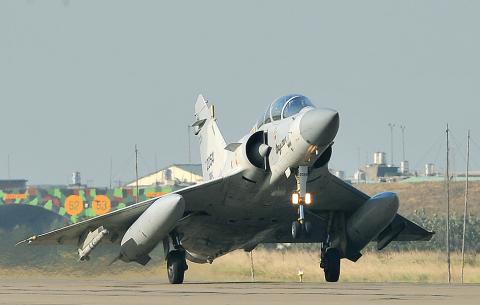Taiwan could soon file a complaint against France over alleged illegal commissions and kickbacks surrounding the 1992 sale of 60 Mirage 2000-5 fighter aircraft, reports said yesterday.
The news comes a little more than six months after defense company Thales wired US$875 million into a Taiwanese government bank account following a decade-long legal battle over kickbacks and illegal commissions for the US$2.5 billion sale by Thomson-CSF (which became Thales in 2000) of six Lafayette-class frigates to the Taiwanese navy in 1991.
Taiwanese authorities said the documents supporting claims that illegal commissions and kickbacks were paid to arms brokers in the Mirage sale were classified and in the possession of the Ministry of National Defense, adding that their content could not currently be made public.

Photo: Liu Hsin-de, Taipei Times
The International Court of Arbitration will go through the documents to determine whether the sale — part of a project codenamed Tango, which also included spare parts, maintenance and upgrades for the aircraft — involved illegal commissions and kickbacks. If the court rules that such activity did take place, France could reportedly face fines of as much as 1 billion euros (US$1.3 billion).
According to French media, the initial contract for 48 Mirage 2000-5Ei interceptors and 12 Mirage 2000-5D twin-seat trainers in 1992 amounted to 22.8 billion francs (US$4.53 billion at the time), with Dassault Aviation and Thomson-CSF as the principal contractors and Matra providing the weapons systems.
However, Taiwan paid an additional 6 billion francs for the aircraft, a discrepancy that prompted the Control Yuan in 2002 to recommend that a probe be launched. The 6 billion francs could represent the amount paid in illegal commissions and kickbacks, reports said.
The Taiwanese air force announced in May 2010 that a review of the Mirage contract had been started. Reports at the time said Andrew Wang (汪傳浦), one of the arms dealers used as an intermediary in the Lafayette scandal, might also have played a role in the Mirage sale.
According to information that could not be independently verified, French officials discreetly approached the administration of former president Chen Shui-bian (陳水扁) after 2002 to ask it to cancel any legal procedures against French defense contractors over the Lafayette and Mirage sales.
The Mirage aircraft, which remain in service, are all based in Hsinchu.
The Bureau Francais de Taipei yesterday refused to comment on the matter, telling the Taipei Times it was closely following developments on the issue.
The Paris-based Court of Arbritation last night would not confirm whether Taiwan had filed a complaint over the Mirage deal, saying that all arbitration cases were confidential.

Tropical Storm Gaemi strengthened into a typhoon at 2pm yesterday, and could make landfall in Yilan County tomorrow, the Central Weather Administration (CWA) said yesterday. The agency was scheduled to issue a sea warning at 11:30pm yesterday, and could issue a land warning later today. Gaemi was moving north-northwest at 4kph, carrying maximum sustained winds near its center of up to 118.8kph and gusts of 154.8kph. The circumference is forecast to reach eastern Taiwan tomorrow morning, with the center making landfall in Yilan County later that night before departing from the north coast, CWA weather forecaster Kuan Shin-ping (官欣平) said yesterday. Uncertainty remains and

SEA WARNING LIKELY: The storm, named Gaemi, could become a moderate typhoon on Wednesday or Thursday, with the Taipei City Government preparing for flooding A tropical depression east of the Philippines developed into a tropical storm named Gaemi at 2pm yesterday, and was moving toward eastern Taiwan, the Central Weather Administration (CWA) said. Gaemi could begin to affect Taiwan proper on Tuesday, lasting until Friday, and could develop into a moderate typhoon on Wednesday or Thursday, it said. A sea warning for Gaemi could be issued as early as Tuesday morning, it added. Gaemi, the third tropical storm in the Pacific Ocean this typhoon season, is projected to begin moving northwest today, and be closest to Taiwan on Wednesday or Thursday, the agency said. Today, there would likely

DISRUPTIONS: The high-speed rail is to operate as normal, while several airlines either canceled flights or announced early departures or late arrivals Schools and offices in 15 cities and counties are to be closed today due to Typhoon Gaemi, local governments announced last night. The 15 are: Taipei, New Taipei City, Taoyuan, Tainan, Keelung, Hsinchu and Kaohsiung, as well as Yilan, Hualien, Hsinchu, Miaoli, Chiayi, Pingtung, Penghu and Lienchiang counties. People should brace for torrential rainfall brought by the storm, with its center forecast to make landfall on the east coast between tonight and tomorrow morning, the Central Weather Administration (CWA) said. The agency issued a sea warning for the typhoon at 11:30pm on Monday, followed by a land warning at 11:30am yesterday. As of

CASUALTY: A 70-year-old woman was killed by a falling tree in Kaohsiung as the premier warned all government agencies to remain on high alert for the next 24 hours Schools and offices nationwide are to be closed for a second day today as Typhoon Gaemi crosses over the nation, bringing torrential rain and whipping winds. Gaemi was forecast to make landfall late last night. From Tuesday night, its outer band brought substantial rainfall and strong winds to the nation. As of 6:15pm last night, the typhoon’s center was 20km southeast of Hualien County, Central Weather Administration (CWA) data showed. It was moving at 19kph and had a radius of 250km. As of 3pm yesterday, one woman had died, while 58 people were injured, the Central Emergency Operation Center said. The 70-year-old